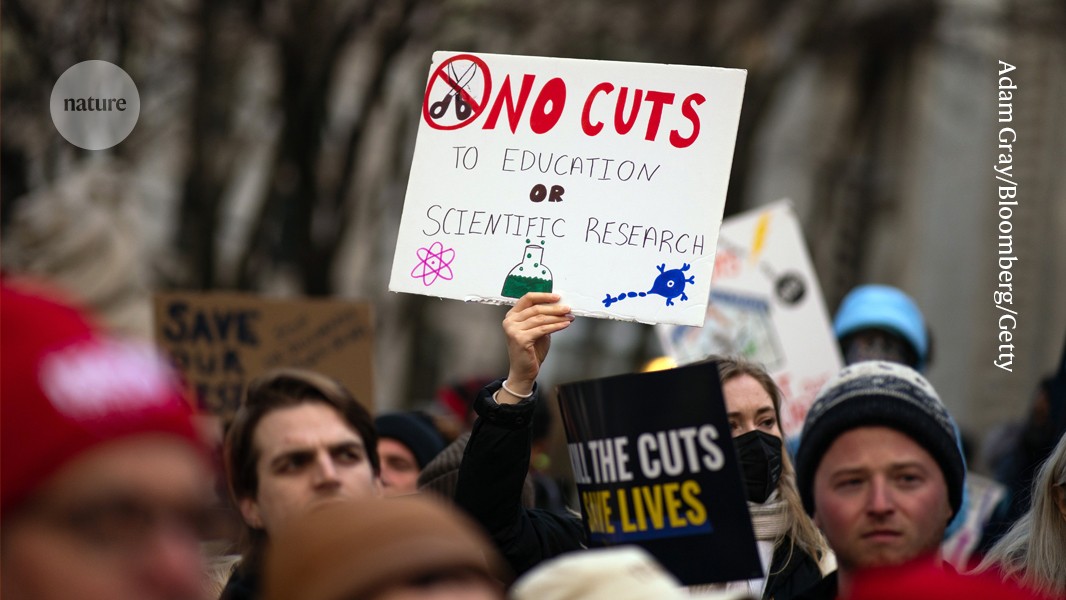Protesters rally in New York City against the Trump administration’s cuts to state and federal funding for scientific research and education.Credit: Adam Gray/Bloomberg/Getty
In mid-April, Maryrose Weatherton, a biologist at the University of New Hampshire in Durham, received a letter from her programme officer stating that her National Science Foundation (NSF) grant had been terminated because it no longer aligned with the foundation’s priorities.
The grant was for examining whether university students who are studying science, technology, engineering or mathematics have equitable access to the resources they need to succeed in class. This choice of topic made the grant liable to cancellation under the federal government’s stated goal of no longer funding work investigating diversity, equity and inclusion (DEI). Weatherton was well aware that the administration of President Donald Trump was defunding research such as hers, but she was still shocked when it happened.
“I got on the phone and called my state senator and representative. I felt like I went down every avenue and there was just nothing I could do,” said Weatherton, who was in her second year as a postdoc. Her position has now ended.
Turmoil at US science academy as Trump cuts force layoffs
Weatherton’s experience reflects a broader trend. In May, the National Postdoctoral Association (NPA) conducted a survey of its 23,000 members to assess the impact of the Trump administration’s first 100 days on postdoctoral researchers. Just under 2% — 378 respondents — took part in the survey. Of those, 197 people (52%) reported cuts to their federal funding. This marked a 40% increase from an earlier NPA survey, conducted after Trump’s first month in office; in that survey, sent to the same number of members, 109 out of 293 respondents reported similar cuts. Notably, the proportion of respondents who had lost their positions increased almost threefold (from 4% to 11%) between the two surveys.
Maryrose Weatherton had her National Science Foundation grant cancelled in April.Credit: Joshua Rosenberg
A generation lost
It’s hard to know how representative these numbers are. But “the US risks losing an entire generation of leaders in science and research, with tremendous impact on those undergraduate and graduate students under their wings”, said Tom Kimbis, the executive director and chief executive of the NPA.
The grant terminations remain in flux. In mid-June, Judge William G. Young at the Federal District Court for the District of Massachusetts ordered the restoration of some NIH grants that were terminated because of their association with DEI, calling their termination “arbitrary and capricious”. The Department of Health and Human Services said it “was exploring all legal options, including filing an appeal and moving to stay the order”, according to ProPublica, a non-profit online news organization in New York City. The department is the parent agency of the NIH.
‘We were ready for this’: meet the scientists suing the Trump administration to reinstate terminated grants
Fifty-five per cent of the respondents were US citizens, 4% were permanent residents and the rest were international postdocs. In line with the Trump administration’s crackdown on immigration and international scholars, including tightening visa restrictions, 21% of respondents said they’d been affected by visa and immigration issues. And, in response to a question asked just in the second survey, 39% said they were fearful of travelling.
Neuroscientist Haroon Popal, whose parents were refugees from Afghanistan, says he grew up in northern Virginia and benefited from free or reduced-cost lunch programmes. He made his way through university on federal grants that were available to qualifying low-income students. His postdoctoral research, into the cerebellum and social learning at the University of Maryland in Baltimore, was funded by an NIH Blueprint and BRAIN Initiative D-SPAN Award. The award was designed to support outstanding graduates from diverse backgrounds, including those from disadvantaged backgrounds.

